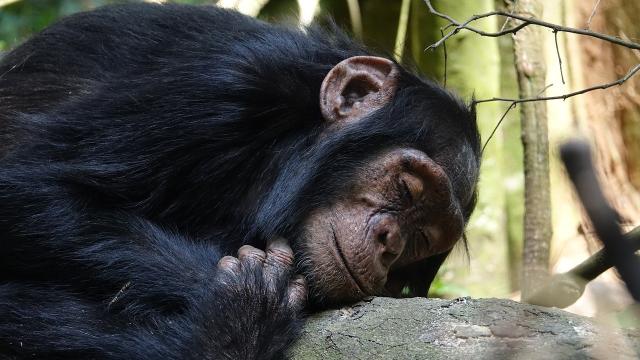In a twist that rivals cinema’s best, a new study published Tuesday in Royal Society Open Science suggests a horrible truth: We’ve been the damn dirty apes all along. It found that beds made by one of our closest primate relatives, chimpanzees, contain little personal filth, meaning germs and parasites from their own body, and certainly much less filth than what’s typically seen in human homes and beds.
Chimpanzees, like all great apes (a category that includes humans), regularly use the world around them to build structures, including beds to sleep in every night. Chimps in particular spend up to half their lives in these beds, built up in trees and made of interwoven branches under a leafy mattress. Unlike humans, though, chimps usually sleep in any one bed for a single night, abandoning it the next morning.
That fact gave researchers the opportunity to sample the bacterial environment of 41 chimp beds in Tanzania using cotton swabs, as well as the forest underneath them. They also used vacuums to suck up any potential parasites from 15 beds and their immediate surroundings.
Because human homes contain a much less diverse neighbourhood of bacteria than the outside world, the researchers theorised the same would be true of chimps. But the bacteria found in chimp beds were as diverse as the world around them. There were also almost none of the bacteria commonly found in or around chimp bodies on the beds, another sharp contrast from the disgusting beds we spend our time on. And the same was true of chimp-specific parasites.
“We found almost none of those microbes in the chimpanzee nests, which was a little surprising,” said lead author Megan Thoemmes, a Ph.D. student at North Carolina State University, in a statement. “We also expected to see a significant number of arthropod parasites, but we didn’t. There were only four ectoparasites found, across all the nests we looked at. And that’s four individual specimens, not four different species.”
Overall, only 3.5 per cent of the bacteria found in chimp beds likely belonged to chimps, whether from their mouth, skin, or faeces. By contrast, it’s estimated that around 35 per cent of the bacteria found in human beds belong to us, according to Thoemmes.
The study, the authors say, is the first to examine the bacterial environment of mammal-built structures compared to those made by people. It’s also a testament to chimps’ personal hygiene: They regularly check and groom each other for parasites, for instance, and they’re also careful not to get poo into their beds, which is apparently more than can be said for many people. But more than just shaming the human race, Thoemmes and her team think their findings underline the hidden consequences of having learned how to shelter ourselves from the outside world for long periods of time.
“This work really highlights the role that man-made structures play in shaping the ecosystems of our immediate environment,” Thoemmes said. “In some ways, our attempts to create a clean environment for ourselves may actually make our surroundings less ideal.”
But it’s not the germs that come from our bodies that are necessarily the real problem. Instead, it’s more what we’re missing out on. Research has long suggested that growing up in a less diverse microbial environment (i.e., a cleaner space) ironically makes us more likely to develop disorders like allergies, asthma, and other autoimmune disorders, thanks to an undertrained immune system that can’t easily tell friend from foe.
